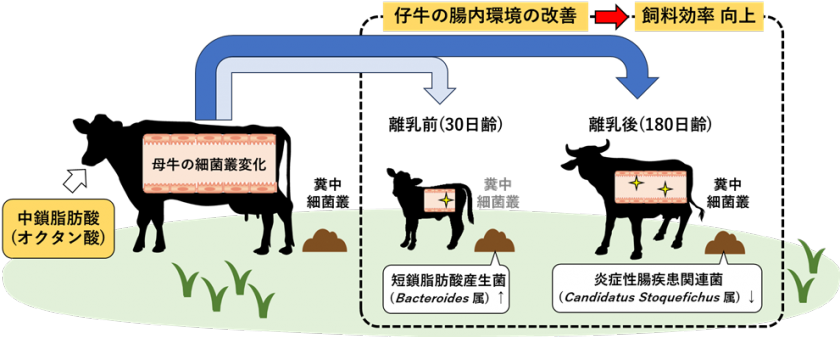Associate Professor Hideyuki Takahashi and his team uncover the maternal transmission of gut microbiota from cow to calf
Dietary Supplementation of Medium-Chain Fatty Acids to Mother Cows Modulates Gut Microbiota and Enhances Feed Efficiency in Calves
Points
- Previous studies by this research group have demonstrated a correlation between the gut microbiota of calves and that of their mother cows.
- This study revealed that regulating the maternal gut microbiota is crucial for improving the intestinal environment of calves, with effects more pronounced during the growing phase (180 days of age) than during the suckling phase (30 days of age).
- Calves born to cows supplemented with medium-chain fatty acids (octanoic acid*1) showed a tendency toward improved feed efficiency. This suggests that nutritional intervention in mother cows to establish a foundational gut microbiota in calves may represent a novel approach that could complement and enhance direct interventions such as probiotic administration*2 in the future.
Abstract
Graduate student Haruki Yamano (first author) and Associate Professor Hideyuki Takahashi from the Faculty of Agriculture, Kyushu University, in collaboration with Dr. Hirokuni Miyamoto (Visiting Senior Scientist) and Dr. Hiroshi Ohno (Team Director) from the RIKEN Center for Integrative Medical Sciences, Dr. Atsushi Kurotani (Researcher at the time of study; currently Research Center for Agricultural Information Technology, National Agriculture and Food Research Organization), and Dr. Jun Kikuchi (Team Director) from the RIKEN Center for Sustainable Resource Science, as well as Dr. Shigeharu Moriya (Senior Research Scientist) and Dr. Satoshi Wada (Team Director) from the RIKEN Center for Advanced Photonics, conducted an industry-academia collaborative study with Kanematsu Agritech Co., Ltd. and Sermas Co., Ltd, a venture company from Chiba University. This study demonstrated that controlling the gut microbiota of mother cows enables modulation of the intestinal environment of their calves.
In Japanese Black calves, growth retardation associated with diarrhea is a major issue in the field. To address this problem, direct administration of probiotics and prebiotics*3 to calves has been attempted to regulate their gut microbiota, and the effectiveness of these interventions has been reported.
However, to further enhance these effects, foundational control of the gut microbiota in calves is considered essential. In previous studies, this research group demonstrated a strong association between the gut microbiota of mother cows and that of their calves after weaning (Press release dated August 29, 2024*4). Based on these findings, the present study investigated whether modulation of the maternal gut microbiota could be used to control the intestinal environment of calves.
In this study, octanoic acid-a medium-chain fatty acid-was administered to Japanese Black breeding cows, and both the rearing performance and fecal microbiota of the cows and their calves were analyzed.
As a result, calves born to cows supplemented with octanoic acid showed a tendency toward improved feed efficiency. Microbiota analysis of fecal samples revealed that, at 30 days of age (suckling phase), a positive structural relationship was observed with Bacteroides, known producers of short-chain fatty acids. At 180 days of age (growing phase), a negative structural relationship was identified with Candidatus Stoquefichus, a genus associated with inflammatory bowel diseases. These relationships were elucidated through computational approaches. Taken together, the findings suggest that modulation of the maternal gut microbiota may improve the intestinal environment and feed efficiency in calves. Furthermore, in combination with the thermophilic probiotic Caldibacillus hisashii*⁵-previously identified by this research group-this approach holds promise for contributing to the development of next-generation livestock technologies that enhance calf growth while reducing environmental impact.
This research was published in Scientific Reports, a journal from Springer Nature, on Monday, September 29, 2025.

In this study, medium-chain fatty acid (octanoic acid) was administered to Japanese Black cows from 60 days before the expected calving date until 3 days after delivery. The fecal microbiota of the calves born to these cows was comprehensively analyzed at 30 days of age (suckling phase) and 180 days of age (growing phase).
The results showed that calves born to octanoic acid-supplemented cows exhibited a positive association with short-chain fatty acid-producing bacteria (Bacteroides genus) at 30 days of age, and a negative association with bacteria linked to inflammatory bowel disease (Candidatus Stoquefichus genus) at 180 days of age. These relationships were identified as structurally significant through computational analysis.
Glossary
*1 Octanoic Acid
Octanoic acid is a medium-chain fatty acid with eight carbon atoms. It naturally occurs in coconut oil, butter, and human breast milk, and is characterized by its low solubility in water. Due to its rapid absorption and utilization as an energy source, it is commonly used as a component of MCT (medium-chain triglyceride) oil.
Beyond food applications, octanoic acid is also used in cosmetics and as a reagent in organic synthesis. It is believed to possess antimicrobial and antifungal properties, and has been explored as a supportive agent in the treatment of infectious diseases.
*2 Probiotics
Live microorganisms that, when administered in adequate amounts, confer health benefits to the host by improving the balance of the intestinal microbiota. Common examples include lactic acid bacteria and Bifidobacterium species, which are widely used as microbial supplements.
*3 Prebiotics
Prebiotics are dietary components that serve as nutrients for beneficial gut bacteria, promoting their growth and activity. They are typically composed of oligosaccharides and dietary fibers, and help improve gut health by supporting a balanced intestinal microbiota.
*4 Transmission and Causal Structure of Gut Microbiota Between Mother and Calf in Grazing Systems: A Computational Understanding of Environmental Factors Influencing the Functional Independence of Calf Gut Microbiota
Kyushu University Press Release https://www.kyushu-u.ac.jp/ja/researches/view/1141/
RIKEN Press Release https://www.riken.jp/press/2024/20240829_2/index.html
*5 Caldibacillus hisashii (International Accession Number: BP-863):
Improvement of the gut microbiota in calves--such as an increase in Bacteroidetes and a tendency toward reduced methanogenic bacteria--has been confirmed, and the findings have been publicly released.
Kyushu University Press Release https://www.kyushu-u.ac.jp/ja/researches/view/741
RIKEN Press Release https://www.riken.jp/press/2022/20220325_4/index.html
Publication Information
Journal: Scientific Reports
Title: Maternal administration of octanoate, a medium-chain fatty acid, improves feed efficiency of Japanese black calves through influencing gut bacteriome structure
Authors: Haruki Yamano, Hiroshi Horike, Yutaka Taguchi, Yudai Inabu, Hirokuni Miyamoto, Atsushi Kurotani, Nonomi Suzuki, Shigeharu Moriya, Teruno Nakaguma, Chitose Ishii, Makiko Matsuura, Naoko Tsuji, Tetsuji Etoh, Yuji Shiotsuka, Ryoichi Fujino, Satoshi Wada, Jun Kikuchi, Hiroshi Ohno, and Hideyuki Takahashi
DOI:10.1038/s41598-025-18490-0
- For more details on this research, click here.
For Research-related inquiries












 Contact
Contact
 Access Map
Access Map

